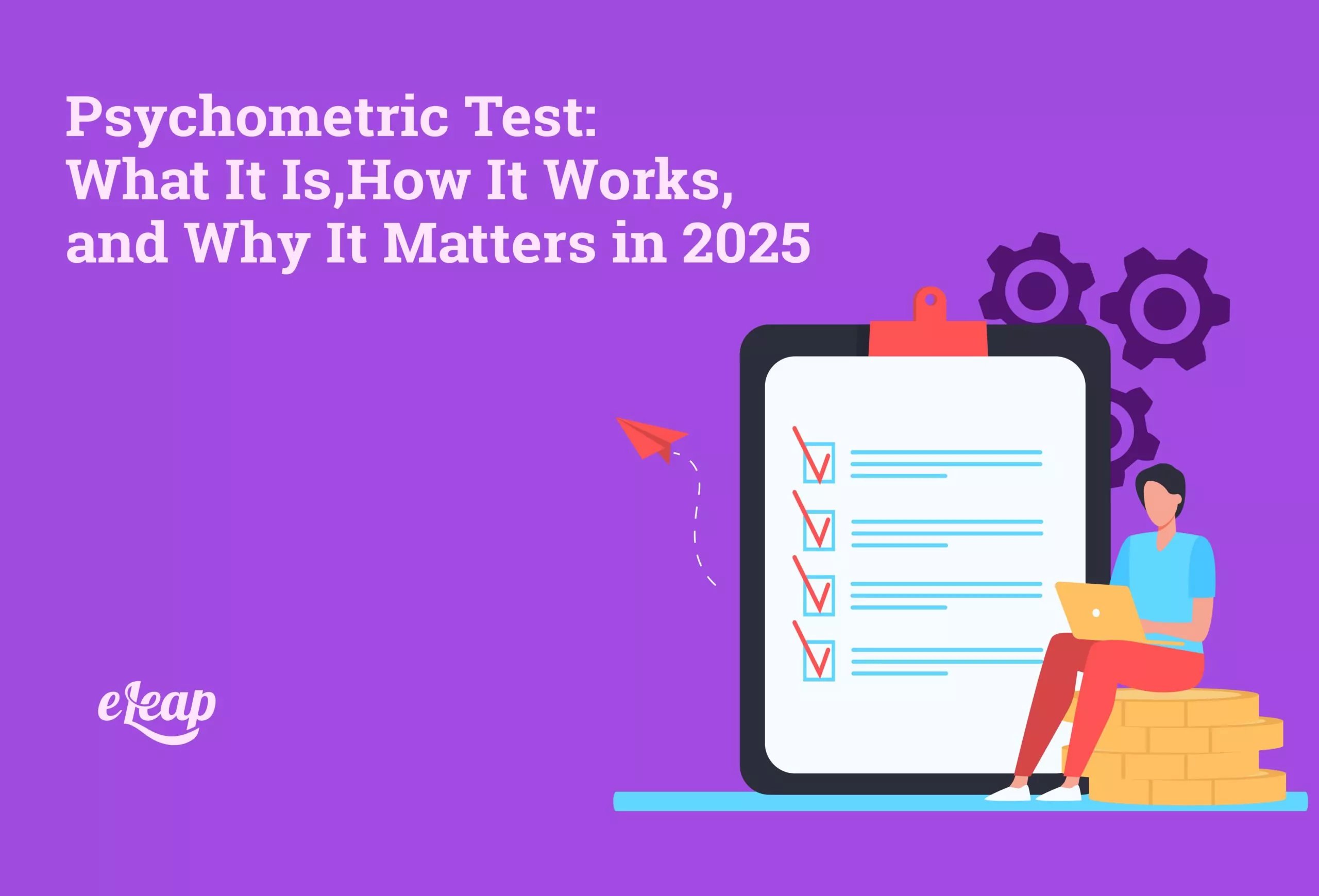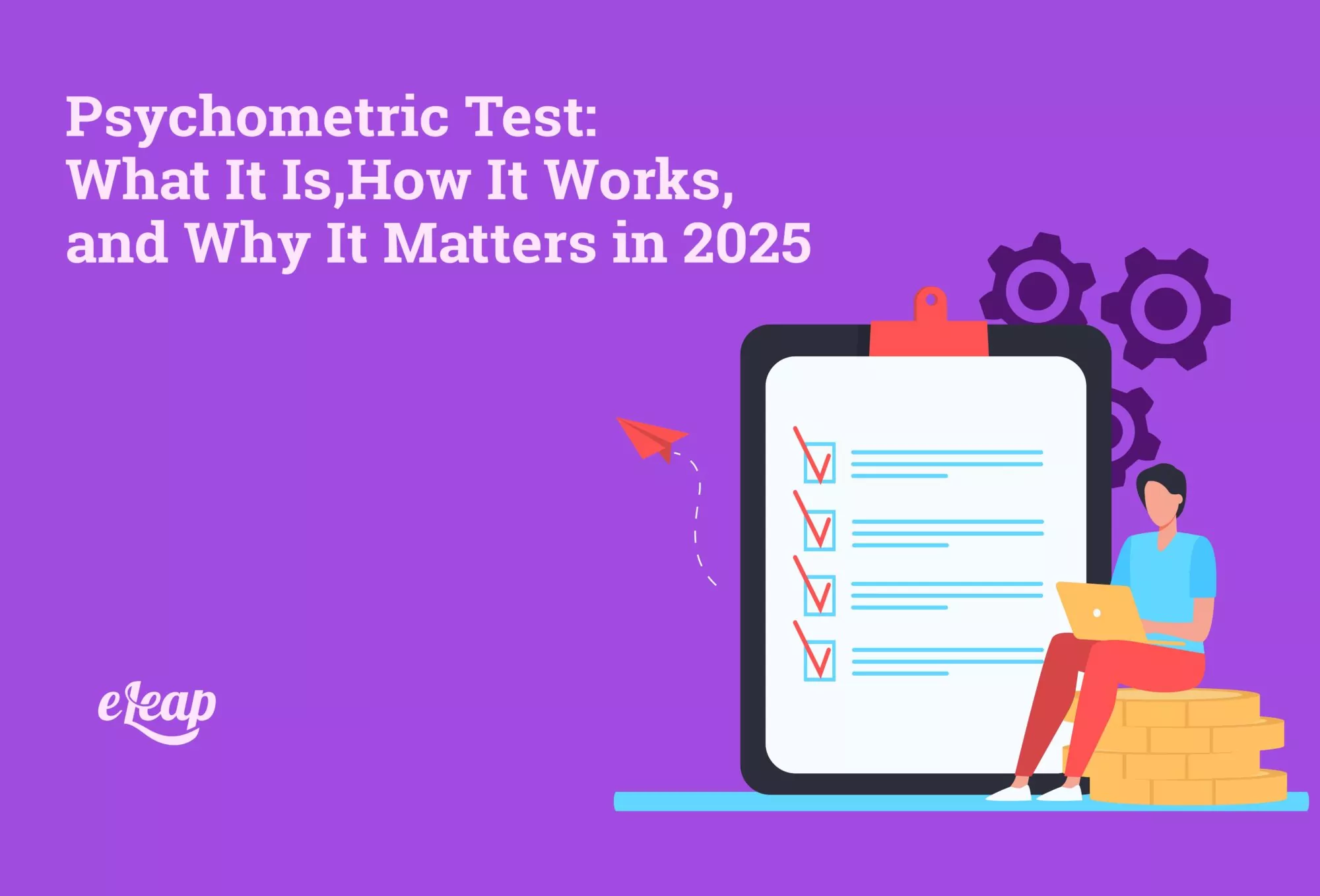Psychometric Test: What It Is, How It Works, and Why It Matters in 2025

Imagine a world where science could support hiring the right candidate, guide a student’s career path, or help you understand your personality. Welcome to psychometric testing, a field combining psychology and measurement to assess individuals’ mental capabilities and behavioral traits. A psychometric test is a scientific method for measuring cognitive abilities, emotional intelligence, personality traits, and behavioral styles. As more businesses, educators, and individuals turn to data-driven decision-making, psychometric tests have emerged as powerful and indispensable tools. See how eLeaP®’s Performance Management Platform helps you apply these insights to drive better results.
The history of psychometric testing dates back to the early 20th century, but these assessments have evolved significantly and gained prominence recently. In 2025, psychometric tests are more sophisticated and widely used, helping organizations make informed decisions about hiring, team formation, and professional development.
What Is a Psychometric Test?
A psychometric test is a standardized assessment designed to measure an individual’s psychological attributes objectively. These tests evaluate cognitive abilities, personality characteristics, and behavioral tendencies through carefully constructed questions and tasks.
Psychometric tests are characterized by their standardization and reliability. They are administered in controlled environments to ensure consistency and fairness. Unlike subjective assessments, psychometric testing provides a level playing field for all participants, making it a valuable tool for making important decisions.
The core components of most psychometric tests include:
- Cognitive ability sections that assess reasoning, problem-solving, and critical thinking
- Personality inventories that map behavioral preferences and working styles
- Situational judgment scenarios that predict workplace behavior
- Emotional intelligence measures that evaluate interpersonal capabilities
The most common metrics used in psychometric tests are intelligence, reasoning ability, personality dimensions, and emotional responses. These dimensions offer a comprehensive view of a person’s mental and emotional profile.
Types of Psychometric Tests Explained

Understanding the different types of psychometric tests can help you determine which assessment best suits your goals. Each type serves a specific purpose and offers unique insights.
Aptitude Tests
Aptitude tests measure cognitive skills and are frequently used in hiring processes. They assess a candidate’s potential to perform specific tasks and solve problems. Common formats include:
- Numerical reasoning tests: Focus on interpreting data, performing calculations, and identifying trends
- Verbal reasoning tests: Measure comprehension and the ability to analyze written information
- Abstract reasoning: Evaluates pattern recognition and logical problem-solving
- Mechanical reasoning tests: Assess understanding of physical principles and mechanics
Personality Tests
Personality assessments help identify an individual’s behavior patterns, motivations, and compatibility with job roles or team dynamics. Widely used frameworks include:
- The Big Five Personality Traits (OCEAN)
- The Myers-Briggs Type Indicator (MBTI)
- The DISC personality profile
These tests provide insights into openness, conscientiousness, extraversion, agreeableness, and emotional stability. Employers often use personality psychometric tests to understand how a candidate might behave in a team or under stress.
Emotional Intelligence Tests
Emotional intelligence (EI) tests measure a person’s ability to perceive, understand, and manage emotions. Popular tests in this category include the Emotional Quotient Inventory (EQ-i) and the Mayer-Salovey-Caruso Emotional Intelligence Test (MSCEIT).
Emotional intelligence is increasingly recognized as a key indicator of leadership potential and interpersonal effectiveness, especially in roles that require empathy, communication, and collaboration.
Situational Judgment Tests
Situational Judgment Tests (SJTs) present candidates with realistic scenarios to evaluate their decision-making skills. These psychometric tests help assess leadership capabilities, ethical judgment, and customer service skills. Candidates are asked to choose the most and least effective responses from multiple options, simulating real-world challenges.
How Psychometric Tests Work
The methodology behind psychometric tests is based on psychological theory and statistical principles. A typical psychometric test begins with a carefully constructed set of questions or tasks to elicit specific responses that reveal underlying traits or abilities.
Standardized conditions are essential when administering a psychometric test. Psychometric testing environments should minimize distractions and provide clear online or in-person instructions. Depending on the specific assessment type, most modern psychometric tests are timed.
After completion, psychometric test responses are analyzed using sophisticated scoring algorithms. These algorithms compare individual results against normative information collected from large sample populations. Interpreting psychometric test results requires trained professionals to understand the assessments’ statistical foundations and psychological implications.
Unlike informal assessments, psychometric tests are developed using scientific methodologies to ensure reliability and validity. Each psychometric test undergoes rigorous statistical analysis to verify that it consistently measures what it claims to measure. The standardized nature of psychometric testing allows for objective comparison between candidates, removing subjective biases that might influence traditional evaluation methods.
Applications of Psychometric Tests
Recruitment and Hiring
Psychometric tests help employers objectively assess candidates beyond resumes and interviews in recruitment. They streamline the hiring process by identifying candidates who possess the right mix of cognitive abilities and personality traits. This approach reduces bias, enhances job fit, and improves employee retention.
Many companies, including global firms like PwC and Unilever, use psychometric tools to support their talent acquisition strategies. For instance, PwC employs game-based psychometric assessments to evaluate creativity and innovation, while Unilever integrates AI-driven assessments to align with company values.
Human resource professionals use these assessments to identify candidates whose abilities and traits align with job requirements. By incorporating psychometric testing into hiring processes, companies can reduce turnover and improve job fit.
Educational Guidance
Educators and counselors use psychometric tests to evaluate students’ learning styles, aptitudes, and potential career paths. These tests aid in developing personalized learning strategies and providing direction for future academic and professional goals. By understanding a student’s strengths and areas for improvement, educators can tailor their support to boost outcomes.
Personal and Professional Development
Psychometric tests also play a crucial role in employee development. These assessments help identify strengths and growth areas, enabling targeted training interventions. For example, a psychometric test might reveal that a manager excels in strategic thinking but needs support in delegating tasks—information that shapes a personalized development plan.
Whether you seek to improve interpersonal relationships, explore new career opportunities, or understand your natural tendencies, these assessments can provide clarity and direction. Professionals also use psychometric tests in leadership development programs to identify areas for growth, facilitate coaching, and guide succession planning.
Team Building
Psychometric test insights significantly benefit team building. Understanding how team members’ cognitive styles and personalities interact can reduce conflict and enhance collaboration. Many organizations use psychometric testing to create balanced teams with complementary strengths and working styles.
Benefits of Psychometric Testing
Psychometric tests offer a multitude of benefits that make them essential in various domains:
Objectivity and Reliability
- Reduces personal biases in evaluation
- Offers consistent results across different settings
- Well-designed psychometric tests demonstrate high reliability (consistency of measurement) and validity (accuracy in measuring intended attributes)
Efficiency and Cost-Effectiveness
- Streamlines recruitment and selection processes
- Saves time by filtering unsuitable candidates early
- Unlike interviews, which can be influenced by unconscious biases, psychometric testing provides standardized data points that can be compared across candidates.
Predictive Validity
- Strong indicators of future performance and behavior
- Helps match candidates to roles where they are most likely to succeed
Enhanced Team Dynamics
- Improves team composition based on personality compatibility
- Reduces workplace conflict by identifying communication styles
Insightful Personal Development
- Reveals cognitive strengths, personality traits, and working preferences
- Informs career and educational decisions
- Organizations can create more effective training programs and communication strategies tailored to individual needs.
Limitations and Ethical Considerations
While psychometric tests are powerful tools, they come with limitations and ethical implications that must be addressed:
Cultural and Language Sensitivity
Not all psychometric tests are universally applicable. Cultural bias can skew results, especially when a test has not been validated for diverse populations. It’s essential to ensure cultural appropriateness when selecting an assessment.
Anxiety and Test Conditions
High-pressure environments can affect performance on psychometric tests. Test anxiety may lead to inaccurate results, particularly in aptitude assessments. Providing practice sessions and supportive environments can help mitigate this issue.
Data Privacy and Consent
Candidates must know how their psychometric test data will be used, stored, and protected. Organizations using psychometric tests must navigate complex ethical and legal landscapes regarding data storage, consent, and potential algorithmic bias. Transparency and compliance with data protection regulations like GDPR are crucial for maintaining trust.
Overreliance on Testing
While valuable, psychometric assessments should not replace holistic evaluations. They are most effective when combined with interviews, reference checks, and other assessment methods.
Best practices include:
- Combining psychometric tests with traditional hiring methods
- Ensuring test validity and reliability
- Training HR teams on interpretation and ethics
Psychometric Tests in 2025
Recent innovations have transformed psychometric testing. Adaptive psychometric tests adjust question difficulty based on previous responses, providing more precise measurement in less time. Game-based psychometric tests increase engagement while gathering valuable data about decision-making patterns and risk tolerance.
Key Trends
- AI Integration: During psychometric testing, machine learning algorithms analyze response patterns, facial expressions, and voice modulation to generate deeper insights. These AI-enhanced psychometric tests can accurately predict job performance by identifying subtle behavioral indicators.
- Gamification: Engaging formats improve candidate experience and reduce anxiety, making the assessment process more enjoyable while still gathering valuable data.
- Neurodiversity Inclusion: New frameworks ensure accessibility for neurodiverse individuals, recognizing diverse cognitive styles and abilities.
- Mobile-First Testing: Increasing demand for psychometric assessments compatible with smartphones and tablets, making testing more accessible and convenient.
Emerging tools will combine data analytics, behavioral science, and user experience design to deliver more innovative, inclusive psychometric assessments.
How to Prepare for a Psychometric Test
Proper preparation can significantly improve performance and reduce anxiety when taking a psychometric test.
General Strategies
Understand the test format and objectives. Familiarize yourself with sample questions, and ensure you’re well-rested on the assessment day. Reading instructions carefully and pacing yourself are key to success.
Preparing for Aptitude Tests
- Practice basic math, grammar, and logical reasoning daily
- Use platforms like SHL and JobTestPrep for mock exams
- Focus on time management skills to navigate timed tests effectively
Preparing for Personality and EI Tests
- Reflect on your personality traits and behavior in different settings
- Respond honestly; consistency is often more important than “ideal” answers
- Learn about the characteristics being measured to understand what the test reveals
Common mistakes to avoid during psychometric testing include:
- Overthinking questions on personality-based psychometric tests
- Rushing through cognitive psychometric tests without careful reading
- Attempting to “game” the psychometric test by providing inauthentic responses
- Failing to practice similar psychometric test formats beforehand
Numerous resources exist for psychometric test practice, including online platforms offering sample questions and timed simulations. Many career counselors also provide coaching specific to psychometric testing, helping candidates understand what to expect and how to approach different question types.
Conclusion and Next Steps
Psychometric tests provide valuable insights into human cognition and behavior, making them indispensable tools in modern hiring, education, and personal development. Using responsibly and ethically enhances decision-making, improves outcomes, and promotes self-awareness.
The future of psychometric testing continues to evolve with technological advancements and deeper psychological understanding. As organizations seek more accurate ways to predict performance and potential, psychometric tests will remain valuable tools in professional environments.
Whether you’re an employer seeking top talent, an educator guiding students, or an individual pursuing growth, psychometric testing can help you make brighter, more informed decisions. By recognizing the value of objective measurement and embracing the insights that psychometric testing provides, individuals and organizations can make more informed decisions about career paths, team composition, and professional development.
In 2025 and beyond, psychometric tests will continue to provide critical data points for meaningful life and business decisions, offering a scientific approach to understanding human potential and performance.
Take the first step today: explore free resources, consult with a certified professional, or try a practice test. The clarity you gain could shape a brighter, more fulfilling future.